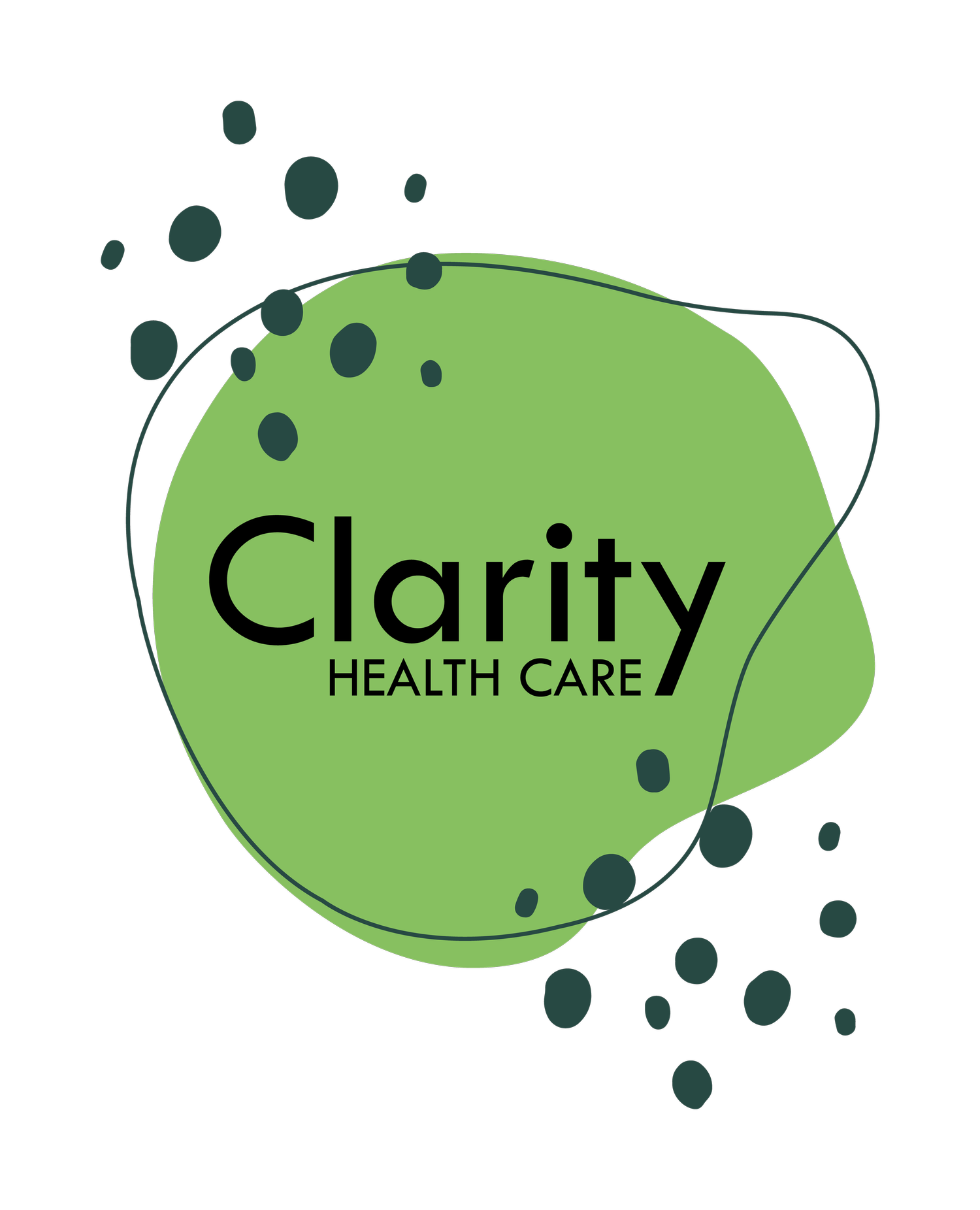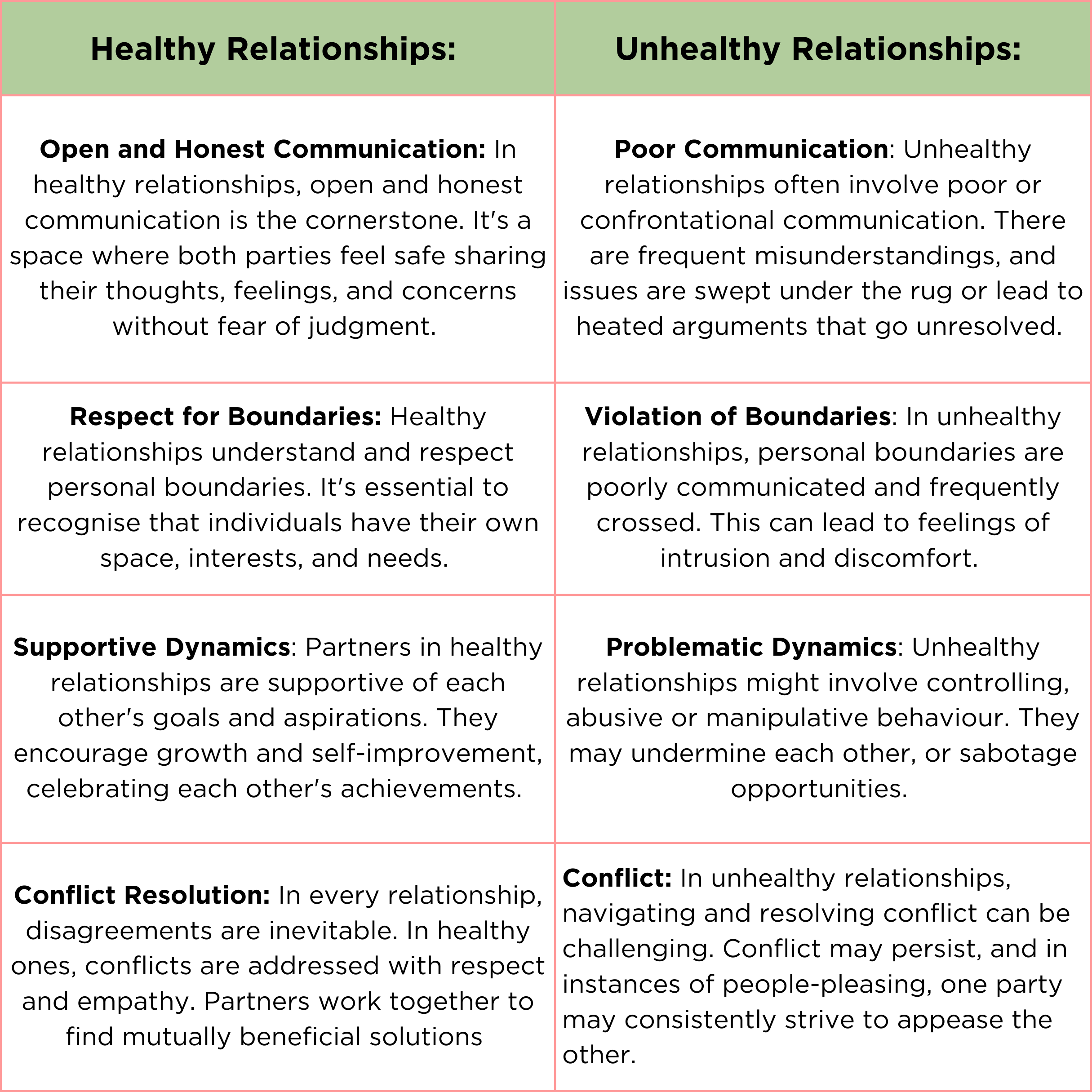Nurturing Healthy Relationships: Your Guide to Building Lasting Bonds
Written by Aimee Oliveri (Clinical Psychologist & Mental Health Content Creator) in Collaboration with Clarity Health Care
Have you ever wondered what sets apart relationships that feel effortless from those that leave you feeling drained? We encounter a wide range of relationships every day, all day. Yet, navigating these connections can pose some of life's most significant challenges. What’s more, the quality of our relationships can profoundly impact our mental and emotional well-being. So, how can we distinguish between healthy and unhealthy relationships, and how do we go about nurturing the healthy ones? In this blog post, we'll explore these questions, drawing from the interpersonal effectiveness skills in Dialectical Behaviour Therapy (DBT).
Understanding Healthy vs. Unhealthy Relationships
Healthy relationships are like a breath of fresh air; they uplift you, provide support, and contribute to your overall happiness. Unhealthy relationships, on the other hand, can be emotionally draining, leading to stress and unhappiness. Here's how to differentiate between the two:
Nuances of Healthy and Unhealthy Relationships
As you absorb the information provided above, you may find yourself grappling with questions about whether it's time to re-evaluate a relationship's health or potentially end it.
It's crucial to recognise that the distinction between healthy and unhealthy relationships is more nuanced than the simplified explanation given above. Healthy relationships can face a wide array of challenges, and not every unhealthy relationship is toxic. Moreover, healthy relationships can experience moments and phases of dysfunction, and vice versa.
However, it is essential to discern between the usual ups and downs in relationships, and persistent patterns of harm. Given the unique nature of every relationship and the specific circumstances of those involved, addressing these subtleties is beyond the scope of this discussion. If you have doubts about a relationship, consider confiding in a trusted support person or seeking guidance from a mental health professional.
Attending to Your Relationships Using Interpersonal Effectiveness Tools
With an improved grasp of the characteristics of a healthy relationship, let's delve into the ways to cultivate and foster these precious connections.
One effective approach to enriching relationships is through Dialectical Behaviour Therapy (DBT), a therapeutic method specially crafted to assist individuals grappling with persistent emotional dysregulation. DBT equips individuals with valuable skills for enhancing their interactions, known as "interpersonal effectiveness skills."
These skills can be a game-changer in building and maintaining healthy bonds. To apply DBT's Interpersonal Effectiveness skills in your relationships, consider the following:
Assertiveness: There are many different styles of communication, but when it comes to relationships we value, assertiveness is generally the most effective way to balance our own needs with those of the relationship. Assertiveness is about communicating your needs in a respectful way. To assist with this, remember the acronym DEAR MAN:
D: Describe the facts of the situation e.g., “you told me you would be home by dinner, but you didn’t get here until 11pm.”
E: Express your feelings or opinions about the situation. Use “I” statements, rather than “You statements e.g., “when you come home late, I start worrying about you.”
A: Assert your needs by asking for what you want or saying no clearly e.g., “I would really like you to call me when you know you’ll be late.”
R: Reinforce or reward the person ahead of time by explaining the positive outcomes of your request e.g., “I won’t feel so anxious if I hear from you when you’re running late.”
M: Mindful - stay mindful of your goals and redirect if things get off topic e.g., “I would still like a call.”
A: Appear Confident - Use a confident voice and physical manner. Make good eye contact. No whispering or staring at the floor.
N: Negotiate - If your original solution is not possible, be willing to collaborate on alternative solutions.
Relationship Effectiveness: Relationship effectiveness provides methods we can use to display respect within our relationships. To achieve this, remember the acronym GIVE:
G: Gentle - Be respectful and avoid attacks or manipulation, even when expressing disappointment or anger.
I: Interested - Practice active listening and demonstrate genuine interest in the other person's perspective.
V: Validate - Acknowledge the other person's experience and emotions.
E: Easy Manner: Maintain a relaxed and open posture, fostering a light-hearted atmosphere. Use humour to ease tension.
Validation: Validation involves recognising the legitimacy of a person's feelings, opinions, or experiences. It serves to:
Make individuals feel heard and understood.
Strengthen relationships and foster problem-solving.
Reduce pressure to prove who is 'right' and diffuse conflicts swiftly
To effectively validate:
Pay attention and show active listening.
Reflect back what you've heard, allowing for corrections and a deeper understanding.
Be sensitive to non-verbal cues and unspoken emotions.
Acknowledge the validity of the person's thoughts, feelings, or actions given their current reality.
Treat the other person as an equal, without condescension or attempts to one-up them.
Remember, validation acknowledges the facts without necessarily agreeing with the person's perspective.
These skills aim to foster healthier communication and stronger, more respectful relationships, both with others and with yourself. By integrating these practices into your interactions, you can pave the way for more fulfilling and nurturing connections.
In Short
Healthy relationships are like the bedrock of a happy, fulfilling life. They contribute to our mental and emotional well-being, offering support, resilience, and a sense of purpose. By applying the Interpersonal Effectiveness skills from DBT, you can enhance your relationships, communicate more effectively, and nurture the bonds that truly matter.
Remember, it's never too late to assess and nurture your relationships. If you'd like to explore more about nurturing healthy relationships or have questions about interpersonal effectiveness in DBT, please contact Clarity Health Care here for guidance on booking an appointment with one of our mental health clinicians. We're here to support you in your journey towards healthier, happier relationships.
In case of emergencies, please call 000 for immediate assistance or go to your nearest hospital emergency department.

